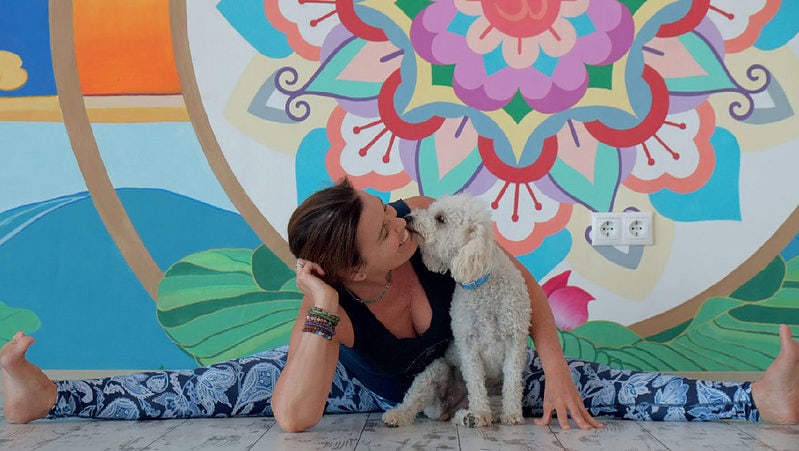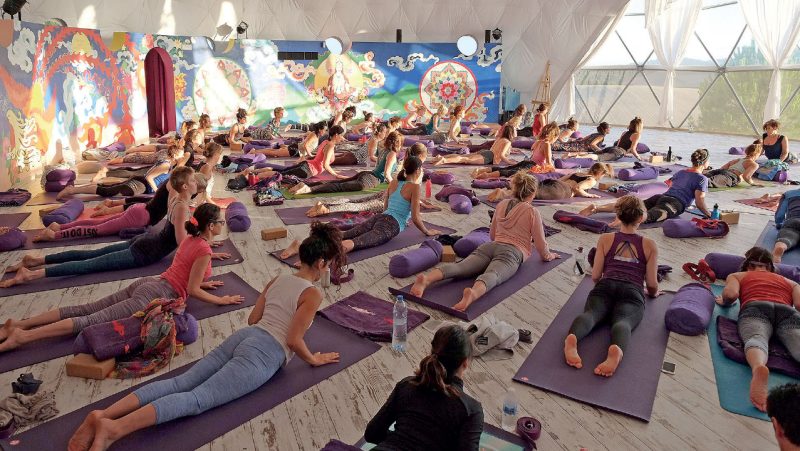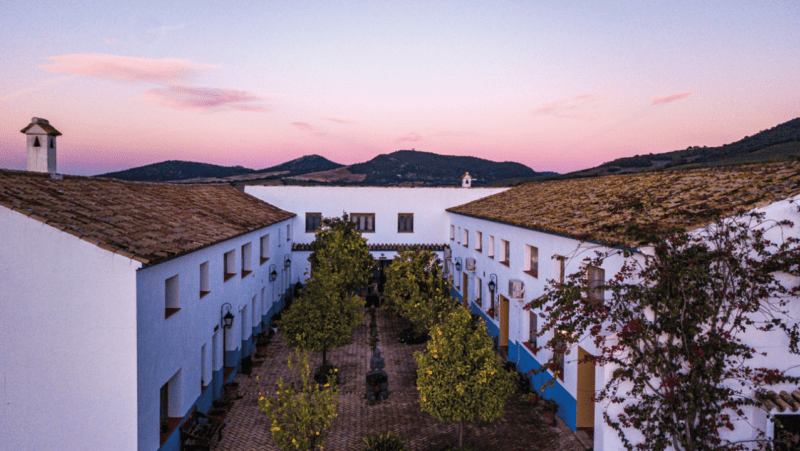Yoga and permaculture: giving back to our blessèd earth. By Vidya Heisel
Blessed Earth
For the past six years, I have been running Suryalila, a now thriving yoga retreat centre in southern Spain. It took us around five years to upgrade the accommodation and decorate the interiors in harmony with our vision. During that time, we had a few gardeners create a medium-sized organic vegetable garden here, but our main focus was on the buildings. However, with a total of 57 acres of agricultural land to take care of, I realised I would have to think a lot bigger, in order to rightfully deserve my role as custodian to this beautiful swath of land.
A part of our land is home to 800 olive trees and we harvest and process our crop every year to produce our own organic, cold-pressed olive oil. We always look forward to tasting the peppery green-gold elixir every year, when it is freshly pressed; it is a veritable amrita, divine nectar, from the gods.
For a while, before coming to Spain, I lived on a small permaculture farm in Portugal. Some of the ideas I learned there made total sense, like, for example, that it is better to plant a variety of plants in the same bed, that support each other in one way or another, than to use monoculture; this can range from repelling the insects that generally attack a nearby plant to helping to create the right soil conditions for a neighbouring plant to thrive.
Permaculture project
Bringing permaculture to my yoga retreat centre seemed like a perfect marriage. As a result of various consultations with experts in the field, we now have a beautiful permaculture design for our farm and we also have a young English permaculture farmer, Jacob Evans, who is managing and executing the project, with a wonderful team of enthusiastic volunteers.
In time, as the project developed, and as I studied permaculture ideas more, I started to realise how essential this method of farming is to our future, and why it is such an important tool to help us to save the planet. I learned how destructive the chemicals that are used in industrial farming are to the soil, and how together with global warming, overgrazing and drought, desertification is fast becoming a serious problem in Spain, as well as many other parts of the world. Almost 30% of Spain is already a desert. The far-reaching educational potential of the project captivated me. I have become passionate about demonstrating a different and more productive way to farm and doing it so well, that other farmers around us will have to take notice.
Danyadara farm
We have named the farm ‘Danyadara’ which means blessed earth, and is a fusion and simplification of two Sanskrit words; Dhanya which means both coriander and blessed and Dhara which means earth. In order to support our ambitious permaculture farming project, we have created a non-profit association and have been actively looking for grants and supporters.
I didn’t have to look very deeply to see that permaculture and yoga are intimately connected. As yogis, we have to walk our talk! A yogic lifestyle promotes a more aware and holistic relationship to life in general. It encourages us to respect and take care of our own bodies. In Tantra Yoga, the body is seen as a sacred vehicle for consciousness. As we become more aware of the breath and more in touch with a mind-body connection we start to be more conscious of the food we are putting in our bodies and the care we are taking to be healthy.
Harmony with nature
Permaculture proposes a way to live in harmony with nature. It is fundamentally a system of agricultural and social design principles, which either are modelled on, or directly making use of, the patterns and intrinsic nature of natural ecosystems.
Since the main tenet of Yogic philosophy is non-dualism, which means everyone and everything in existence is non-separate, we can conclude that our own body and the body of the earth are fundamentally non-different, and should both be treated with the utmost respect, care and love. Everything in existence is made up of the same basic elements. By looking at it this way, the earth is seen as an extension of our material body.
Ahimsa or non-harming is a very important ethical value in yoga. Practicing non-harming is Karma Yoga; engaging in Sattvic or purifying actions. Through permaculture we practice the non-harming of the earth, by not spraying chemicals on it, and not raising monocultures, so that the earth can naturally regenerate itself and the bacteria and fungi in the soil can propagate, allowing ecosystems to flourish. We work in harmony with nature, not against it. We find ways to help the soil to thrive, through intelligent planting, use of homemade compost, manure and earthworms.
Another important ethical concept in yoga is the practice of Asteya or non-stealing. A helpful way to look at how to practice this is to consider ways of giving back to life, instead of just endlessly taking. Nature is always abundant and will give and give until she is completely depleted. We are the custodians of the earth and we have ravaged and pillaged for thousands of years. Now our conscience is calling us to regenerate, to care, to wake up, and to practice generosity towards our planet before it’s too late.
Future plans
Since beginning Danyadara, our permaculture farm, we have planted over 2,000 trees on our land, and, in the next two years, we plan to create a huge food forest, in a large barren seven hectare (17 acre) field. We have already been preparing the field through the extensive use of key-line ploughing, which is a way of rendering the earth with curvy channels, following the contour of the land, to enable a more flowing distribution of water through the forest. A food forest has many levels from higher canopy trees, to smaller trees, which need more shade, bushes, shrubs and herbs; all of it is edible and useful. Our plan is to plant 8,000 trees in the next few years, to create a water harvesting system and a large greenhouse for propagating plants.
We already hold Permaculture Design Courses (PDC’s) to train people in permaculture practices and the gardeners on the courses are able to participate in daily Yoga classes, which is a beautiful blending of the two ideologies.
Our long-term plan is to be able to demonstrate to local farmers the benefits of farming in this way and to offer support in helping them make the changeover. It is important that we create products that will add value to our harvest, through dehydration, bottling and making jams and chutneys. We will demonstrate that it is still possible to make a good living, through farming that is practiced in harmony with nature.
Vidya Heisel is the director of Suryalila Retreat Centre in southern Spain and the director of Danyadara Permaculture Farm
Danyadara is currently running a crowdfunder, to support the creation of a food forest: danyadara.com/crowdfunder







